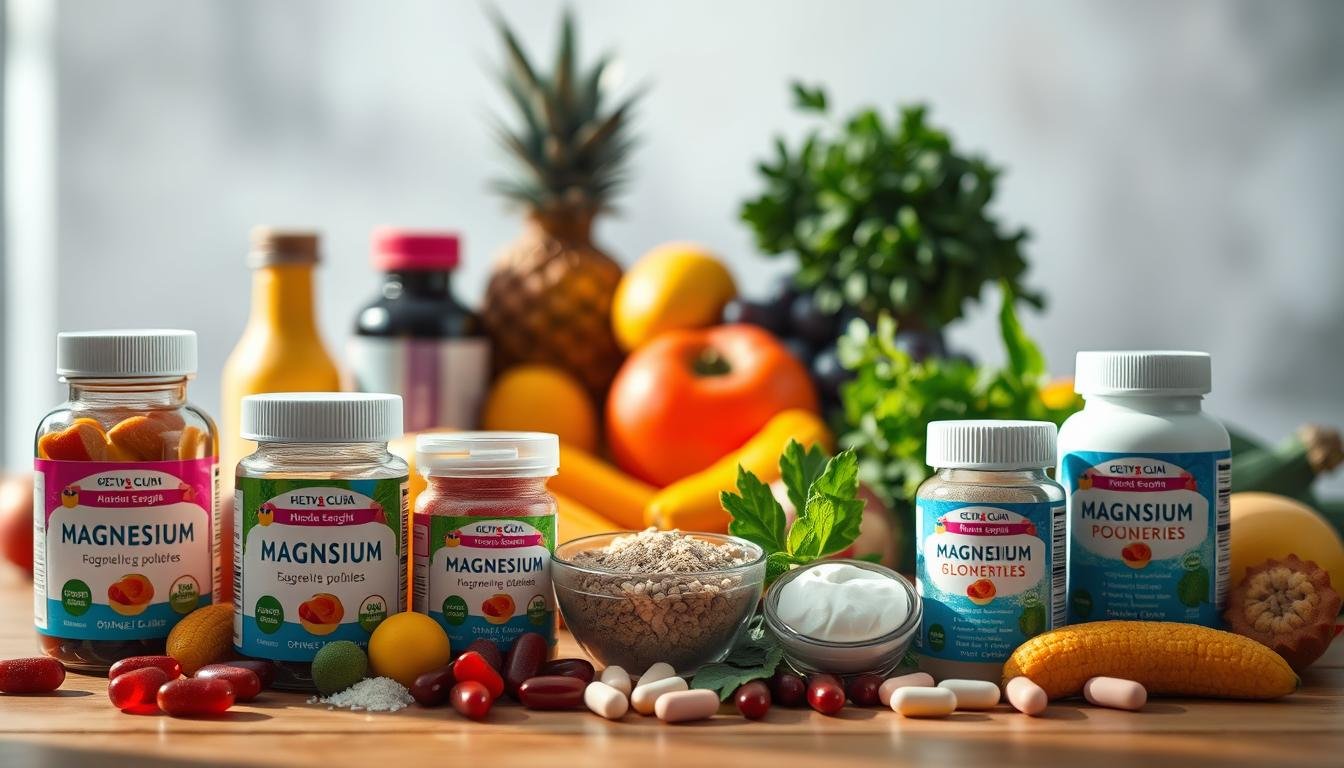Did you know that a single mineral can play a vital role in your child’s growth and overall well-being? Magnesium is essential for supporting bone health, muscle function, and even the nervous system. Yet, many parents overlook its importance in their children’s diets.
With picky eaters and dietary gaps becoming common concerns, ensuring your child gets enough of this crucial mineral can be challenging. This is where kid-friendly supplements like Natural Vitality CALM® Gummies and Natrol® Kids Magnesium come into play. These products are designed to make it easier for children to meet their daily needs.
From supporting strong bones to aiding muscle relaxation, magnesium offers numerous benefits. In this article, we’ll explore why this mineral is so important and highlight some of the best options available to help your child thrive.
Key Takeaways
- Magnesium is crucial for children’s growth, bone health, and muscle function.
- Dietary gaps in picky eaters can make it hard to get enough magnesium.
- Supplements like Natural Vitality CALM® Gummies and Natrol® Kids Magnesium are popular choices.
- This mineral supports the nervous system and overall well-being.
- Daily dosage guidelines recommend 130 mg for children aged 4-8.
Why Magnesium is Essential for Kids
From energy production to bone health, magnesium plays a key role in child development. This mineral is involved in over 300 enzyme activities, making it essential for growing bodies. It supports energy production, DNA synthesis, and nerve function, ensuring your child stays active and healthy.
Magnesium is also crucial for building strong bones, especially during growth spurts. It helps maintain bone density, which is vital for active ages. Without enough magnesium, children may experience fatigue, irritability, or muscle cramps.
The Role of Magnesium in Child Development
This mineral supports the nervous system, helping children stay focused and calm. It also aids in muscle relaxation, reducing the risk of cramps or restless legs. For ages 9-13, the recommended daily intake is 240 mg to meet their growing needs.
Signs of Magnesium Deficiency in Children
Low magnesium levels can lead to trouble sleeping, poor concentration, and irritability. Stress and a diet high in processed foods can deplete magnesium levels. Ensuring your child gets enough of this mineral is key to their overall health and well-being.
Health Benefits of Kids Magnesium
From sleep to mood, magnesium plays a pivotal role in a child’s daily life. This essential mineral supports healthy growth, improves sleep quality, and enhances cognitive function. Ensuring adequate intake can make a significant difference in their overall well-being.
Supports Healthy Growth and Development
Magnesium is vital for building strong bones and muscles. It aids in energy production and helps the body absorb other nutrients. For active children, this mineral ensures they stay healthy and energized throughout the day.
Promotes Better Sleep and Relaxation
Studies show that magnesium regulates melatonin production, leading to deeper and more restful sleep. Products like Natural Vitality CALM Kids Sleep Gummies combine magnesium with melatonin to support a healthy sleep cycle. This can be especially helpful for children who struggle with bedtime routines.
Enhances Mood and Cognitive Function
Magnesium plays a key role in serotonin production, which helps regulate mood and reduce stress. It also supports brain health, improving focus and concentration in school-aged children. Natrol® gummies, with magnesium citrate, are a popular choice for better absorption and effectiveness.
Best Sources of Magnesium for Kids
Magnesium-rich foods and high-quality supplements can make meeting daily needs simple and effective. Whether through a balanced diet or targeted products, there are plenty of ways to ensure your child gets enough of this essential mineral.
Magnesium-Rich Foods for a Balanced Diet
Incorporating magnesium into meals can be both easy and delicious. Nuts like almonds and cashews are excellent sources, while leafy greens such as spinach provide a nutrient-packed boost. Black beans and dark chocolate are also kid-friendly options that add variety to their diet.
For a fun twist, try blending bananas into smoothies or adding chia seeds to yogurt. These simple recipes make it easier to include magnesium-rich foods in your child’s daily routine.
Top-Rated Magnesium Supplements for Kids
When dietary gaps exist, supplements can be a reliable solution. Natural Vitality CALM Kids Gummies are a popular choice for ages 4 and up, offering a citrus flavor and allergen-free formula. Natrol® Kids Magnesium, with 83 mg per serving, is another trusted option that supports absorption with magnesium citrate.
For families seeking vegetarian or non-GMO options, Natrol®’s gelatin-free gummies are a great alternative. Always check dosage to avoid excess intake from combined sources.
By combining magnesium-rich foods with high-quality supplements, you can ensure your child meets their daily needs for optimal health and development.
Conclusion
Ensuring your child’s health involves more than just a balanced diet—it’s about meeting their essential nutritional needs. Magnesium plays a vital role in supporting both physical and mental well-being, from strong bones to relaxed muscles.
For children aged 4-8, the recommended daily intake is 130 mg. Combining dietary sources like nuts and leafy greens with trusted supplements such as Natural Vitality CALM® or Natrol® can help meet these needs effectively.
Before starting any supplement, consult your pediatrician to ensure it’s appropriate for your child’s body. Take advantage of limited-time offers, like Natural Vitality’s 10% off and free shipping, to make supporting your child’s health easier and more affordable.
FAQ
Why is magnesium important for children?
Magnesium plays a key role in supporting healthy growth, strong bones, and proper muscle function. It also helps regulate mood, sleep, and cognitive development in young ones.
What are the signs of magnesium deficiency in children?
Common signs include irritability, trouble sleeping, muscle cramps, fatigue, and difficulty concentrating. If you notice these symptoms, consult a healthcare professional.
How can I ensure my child gets enough magnesium?
Include magnesium-rich foods like leafy greens, nuts, seeds, and whole grains in their diet. If needed, consider safe and age-appropriate supplements after consulting a doctor.
Can magnesium help improve a child’s sleep?
Yes, magnesium promotes relaxation and supports the nervous system, which can lead to better sleep quality and duration for children.
What are the best food sources of magnesium for kids?
Foods like almonds, spinach, black beans, bananas, and yogurt are excellent natural sources of this essential mineral.
Are magnesium supplements safe for children?
When used as directed and under medical supervision, magnesium supplements can be safe. Always choose products specifically designed for children and follow dosage guidelines.







